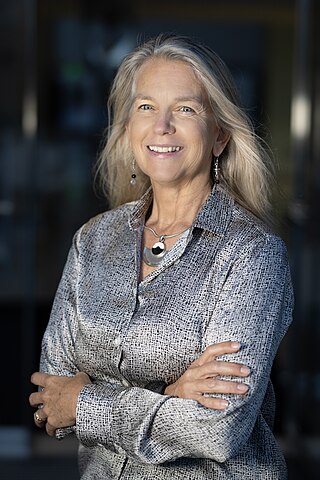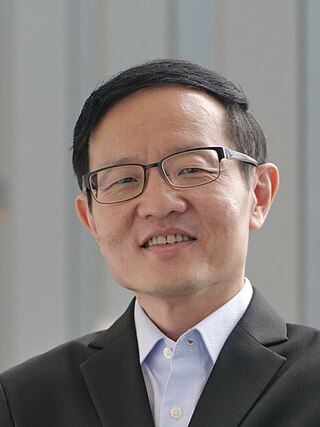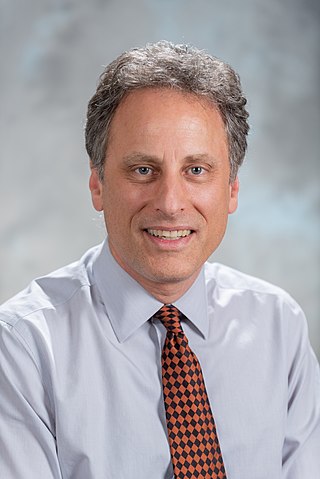
Salvatore Salamone is a scientist and researcher studying diagnostic medicine and therapeutic drug monitoring.

Salvatore Salamone is a scientist and researcher studying diagnostic medicine and therapeutic drug monitoring.
Salamone earned two bachelor's degrees from Villanova University, a master's and a PhD degree from Rutgers University and was a Science Engineering Research Council (SERC) Post-Doctoral Fellow at the University of Oxford, UK. [1]
Salamore is responsible for the development of many of the major reagents used within psychiatric drug level monitoring. [2] [3] He is the founder of Saladax Biomedical, Inc. [1] His contributions to diagnostic medicine have been recognized through several local awards, including the Ben Franklin Innovation Award [4] and the New Jersey Inventors Hall of Fame in 2016. [5] Salamone has 70 FDA-approved products and more than 200 instrument applications. [ citation needed ] He is the editor of a textbook on benzodiazapines [6] and is also the holder of 41 issued US patents. [7] The International Association of Therapeutic Drug Monitoring and Clinical Toxicology (IATDMCT) awarded Salamone the C.E. Pippenger Award for outstanding contributions to the field of Therapeutic Drug Monitoring in 2021. [8]

Pharmacology is the science of drugs and medications, including a substance's origin, composition, pharmacokinetics, pharmacodynamics, therapeutic use, and toxicology. More specifically, it is the study of the interactions that occur between a living organism and chemicals that affect normal or abnormal biochemical function. If substances have medicinal properties, they are considered pharmaceuticals.

William Ralph Brody is an American radiologist and academic administrator. He was the President of The Johns Hopkins University, a position which he held from 1996 to 2009 before becoming the President of the Salk Institute from 2009 to 2015.

Gary K. Michelson is an American orthopedic surgeon, medical inventor, and billionaire philanthropist.

Dava J. Newman is an American aerospace engineer. She is the director of the MIT Media Lab and a former deputy administrator of NASA. Newman is the Apollo Program Professor of Aeronautics and Astronautics and Engineering Systems at the Massachusetts Institute of Technology. She has been a faculty member in the department of Aeronautics and Astronautics and MIT's School of Engineering since 1993.
Tuan Vo-Dinh is R. Eugene and Susie E. Goodson Professor of Biomedical Engineering at the Duke University Pratt School of Engineering and professor of Chemistry and director of the Fitzpatrick Institute for Photonics at Duke.

JN-International Medical Corporation (JNIMC) is a U.S.-based biopharmaceutical corporation which since 1998 has been focused on developing vaccines and diagnostics for infectious disease for developing countries. This private corporation was founded in 1998 by Dr. Jeeri R. Reddy with the help of Dr. Kelly F. Lechtenberg in a small rural town, Oakland, Nebraska. From there it grew and expanded until in the year 2000 the corporation moved to Omaha, Nebraska.

James McEwen is a Canadian biomedical engineer and the inventor of the microprocessor-controlled automatic tourniquet system, which is now standard for 15,000-20,000 procedures daily in operating rooms worldwide. Their widespread adoption and use has significantly improved surgical safety, quality and economy. McEwen is President of Western Clinical Engineering Ltd., a biomedical engineering research and development company and he is a director of Delfi Medical Innovations Inc., a company he founded to commercialize some results of that research and development. He is also an adjunct professor in the School of Biomedical Engineering, in the Department of Orthopaedics and in the Department of Electrical and Computer Engineering at the University of British Columbia.
Martin (Maish) L. Yarmush is an academic, American scientist, physician, and engineer known for his work in biotechnology and bioengineering. His faculty career began in 1984 at MIT in the Department of Chemical Engineering as a Principal Research Associate and Lucille P. Markey Scholar in Biomedical Science. In 1988 he joined Rutgers University, as Professor of Chemical and Biochemical Engineering and a member of the Center of Advanced Biotechnology and Medicine. In 1995, he returned to the Boston area to serve as the Helen Andrus Benedict Professor of Surgery and Bioengineering in the Harvard-MIT Division of Health Sciences and Technology, and to establish the Center for Engineering in Medicine at the Harvard Affiliated Teaching Hospitals. In 2007 he returned to Rutgers to hold the Paul and Mary Monroe Endowed Chair in Science and Engineering and serve as Distinguished Professor in the Department of Biomedical Engineering. He also holds a Lecturer in Surgery and Bioengineering position at Harvard Medical School, and is a member of the Senior Scientific Staff at the Shriners children's hospital in Boston.

Mark S. Gold is an American physician, academic, and researcher known for his work on the effects of opioids, cocaine, tobacco, and food on brain function and behavior. He has held academic positions as a professor of neuroscience and psychiatry and served as chair of the Department of Psychiatry at the University of Florida College of Medicine, where he established the Division of Addiction Medicine.
Mayo v. Prometheus, 566 U.S. 66 (2012), was a case decided by the Supreme Court of the United States that unanimously held that claims directed to a method of giving a drug to a patient, measuring metabolites of that drug, and with a known threshold for efficacy in mind, deciding whether to increase or decrease the dosage of the drug, were not patent-eligible subject matter.

Jane Visvader is a scientist specialising in breast cancer research who works for the Walter and Eliza Hall Institute in Melbourne, Australia. She is the joint head of the Breast Cancer Laboratory with Geoff Lindeman.

Salvatore Domenic Morgera is an American and Canadian engineer, scientist, inventor, and academic. Morgera is a Tau Beta Pi Eminent Engineer, Life Fellow of the Institute of Electrical and Electronics Engineers (IEEE), Fellow of the Institution of Engineering and Technology(IET), Fellow of the American Association for the Advancement of Science (AAAS), Fellow of the Asia-Pacific Artificial Intelligence Association (AAIA), Professor of Electrical Engineering, Professor of Biomedical Engineering, and Director of the C4ISR Defense & Intelligence and Bioengineering Laboratories at the University of South Florida and Professor Emeritus at McGill University, Concordia University, and Florida Atlantic University.
Mark S. Humayun is a Pakistani-American ophthalmologist, engineer, scientist, inventor and academic – the only ophthalmologist elected a member of both U.S. National Academies of Medicine and Engineering. He is a university professor with joint appointments at the Keck School of Medicine of USC and the USC Viterbi School of Engineering.

Andreas Bernkop-Schnürch is an Austrian scientist and entrepreneur currently serving as Head of the Department of Pharmaceutical Technology at the Institute of Pharmacy, University of Innsbruck.
Laura Marcu is an American scientist and a professor of biomedical engineering and neurological surgery at the University of California, Davis. She is also a Fellow of numerous professional societies: the Biomedical Engineering Society, SPIE, The Optical Society and the National Academy of Inventors.
Elwin Orton is a plant biologist known for his contributions in plant breeding techniques. He is known for saving the U.S. Dogwood plant through introduction of new pet-resistant hybrids, for which some were consequently named after him. His plant breeding work and conservation was recently recognized in the New Jersey Inventors Hall of Fame. Orton is currently a Professor Emeritus at Rutgers University, where he teaches plant biology. Orton holds 15 patents in dogwood and holly plant hybrid development.
George Feldstein was an engineer known for his contributions to audio-visual technologies. Feldstein was responsible for the creation of several audio and video control devices, such as a remote for 35mm projects, the first HD digital touch panel, and the RF wireless control system. Feldstein holds 14 patents. Feldstein was the founder and CEO of Crestron Electronics, an audiovisual technologies company. Feldstein holds awards from InfoComm International and the New Jersey Inventors Hall of Fame for his contributions to the AV industry.

Lim Chwee Teck is a Singaporean researcher and entrepreneur. He is a specialist in human disease mechanobiology and in developing medical and wearable technologies for disease diagnosis and precision therapy and bringing them from the laboratory to the bedside.

Mark Robert Prausnitz is an American chemical engineer, currently Regents’ Professor and J. Erskine Love, Jr. Chair in Chemical & Biomolecular Engineering at the Georgia Institute of Technology. He also serves as adjunct professor of biomedical engineering at Emory University and Adjunct Professor of Chemical & Biomolecular Engineering at the Korea Advanced Institute of Science and Technology. He is known for pioneering microneedle technology for minimally invasive drug and vaccine administration, which has found applications in transdermal, ocular, oral, and sustained release delivery systems.
William W. Bachovchin is an American chemist/chemical biologist, academic and researcher. He is a professor of Molecular and Chemical Biology at Tufts University School of Medicine, and the founder of three biopharmaceutical companies: Point Therapeutics, Arisaph Pharmaceuticals, and Bach BioSciences.